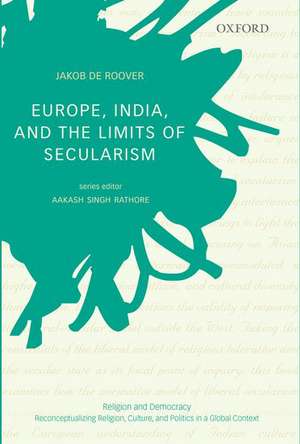Europe, India, and the Limits of Secularism
Autor Jakob De Rooveren Limba Engleză Hardback – 17 feb 2016
Preț: 254.50 lei
Preț vechi: 315.38 lei
-19% Nou
Puncte Express: 382
Preț estimativ în valută:
48.70€ • 50.84$ • 40.30£
48.70€ • 50.84$ • 40.30£
Comandă specială
Livrare economică 04-10 martie
Doresc să fiu notificat când acest titlu va fi disponibil:
Se trimite...
Preluare comenzi: 021 569.72.76
Specificații
ISBN-13: 9780199460977
ISBN-10: 0199460973
Pagini: 296
Dimensiuni: 148 x 218 x 23 mm
Greutate: 0.47 kg
Editura: OUP INDIA
Colecția OUP India
Locul publicării:Delhi, India
ISBN-10: 0199460973
Pagini: 296
Dimensiuni: 148 x 218 x 23 mm
Greutate: 0.47 kg
Editura: OUP INDIA
Colecția OUP India
Locul publicării:Delhi, India
Recenzii
this book is certainly of interest for political theorists and historians curious about the genealogy of the secular thought, the debates it incited during the colonial rule of the British in India, and the contemporary effects of that conversation in India.
This book deserves to be read widely, not only by historians of India and of early modern European political thought, but also by anyone concerned for the future of secularism and for whatever might eventually replace it.
This book deserves to be read widely, not only by historians of India and of early modern European political thought, but also by anyone concerned for the future of secularism and for whatever might eventually replace it.
Notă biografică
Jakob De Roover is Assistant Professor, Department of Comparative Science of Cultures, Ghent University, Belgium
